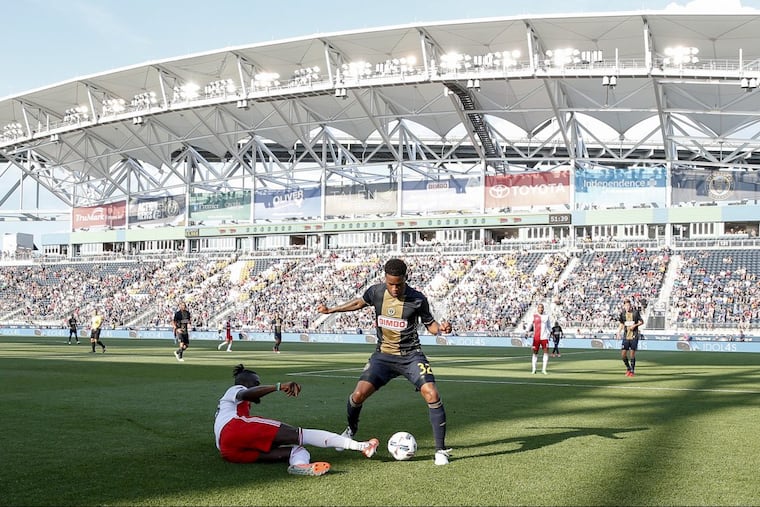Union's handling of Giliano Wijnaldum, Keegan Rosenberry a lesson in player development
Before the Union's season is consigned completely to history, it's worth reviewing one more angle of the way the team's campaign transpired.

Before the Union's season is consigned completely to history, it's worth reviewing one more angle of the way the team's campaign transpired.
The angle in question is about player development: specifically, the development of not-quite-young-anymore outside backs Giliano Wijnaldum and Keegan Rosenberry.
Wijnaldum, a Dutchman who turned 25 in late August, was signed this past winter to be the Union's left back of the future – indeed, the very near future. He earned the starting job for a healthy spell from late June to early September, but gave it back to Fabinho thereafter.
That phrasing is intentional. During Wednesday's postgame press conference, Union sporting director Earnie Stewart spoke of having followed Wijnaldum before signing him, and how he saw inconsistency from the player in past years too.
"That's something that's always been in Giliano's career path, I almost want to say," Stewart said. "He's a very talented kid. He's very athletic. He pretty much has everything. But to be consistent is one of the things he needs to stay, and that was a part that we did not see in this season."
Stewart noted that he and Jim Curtin laid the down law on the matter to Wijnaldum at the start of the year.
"'That's what we want to see from you, day in and day out,'" Stewart said he told Wijnaldum. "I realize for a lot of players it's about output in games, but for us as a technical staff, it goes way further than that. It's day in, day out on the training field too."
Stewart added that "Giliano, for a short time, was there." But he was not there enough.
The time came to judge whether Wijnaldum had earned the significant raise he was in for next year, after getting just $78,337.33 this year,
Stewart decided the player had not done so. The Union thus declined the club option for 2018 on Wijnaldum's contract, ending his time in Philadelphia.
"We look for consistency in players, and that part, I have to say, for the number that we had in his contract for the option year, it was not enough," Stewart concluded.
[Full transcript: Earnie Stewart and Jim Curtin's end-of-season press conference]
A few minutes after Wijnaldum's fate was discussed, Curtin was asked a question about how a player develops that consistency.
This time, that player was Rosenberry. His lack of consistent playing time this year infuriated a sizeable caucus of Union fans. They blamed Curtin for the fact that a player who was an All-Star, Rookie of the Year runner-up and U.S. national team debutant last season regressed in his sophomore campaign.
Curtin is well aware of this. He has been all year. Stewart doesn't keep as public a profile, but he likely knew too – and if he didn't, he certainly heard Curtin get an earful on the subject Wednesday.
The answer from the podium was not as blunt as the criticism launched toward it. But just beneath the surface, there was a pretty clear message: a player's development is as much the responsibility of the player himself as it is of the coach. Perhaps even more.
"Every player goes through highs and lows, peaks and valleys in their development," Curtin said. "Is he as great as [last year's] guaranteed, penciled-in right back, starting national team player? Maybe not. But he's also not defined by just how this year went."
Curtin also noted the importance to him of a player's development off the field. Many observers have no interest in such matters. But the subject here is a 23-year-old, second-year pro who was lavished with praise throughout his rookie season.
Second-year pros in the world's game are often younger than 23. Rosenberry also was a rare college-bred MLS rookie who didn't hit a wall after moving up from from the college game's short season.
But just because he didn't hit the wall then doesn't mean the wall didn't exist. So there may be more merit than usual in considering a wider picture.
"When you talk about development, there's on-the-field development, there's off-the-field development," Curtin said. "There's handling success, there's handling down time. These are all part of growth. To now write him off and say his development has stopped is silly, I think. Because now, if he bounces back and we're a playoff team next year and is an All-Star, did we all of a sudden re-develop him? I don't think that's the case either."
Curtin continued his strong endorsement of Rosenberry's potential a moment later.
"We believe in him," Curtin said. "We'll continue to see him get better. He has all the tools, all the assets on the field to be successful, and now we'll work hard to pull that out of him. I know he's going to attack this offseason with a chip on his shoulder and come back ready to go."
Though the initial question was asked of Curtin, Stewart also offered his own answer.
"Especially for young kids, development goes like this," Stewart said as he waved his hand up and down. "Then once you get to the age of Haris [Medunjanin] and Alejandro Bedoya, you get more linear, you get continuity. You get players that can weather storms by themselves."
There is little doubt that Rosenberry weathered a storm this year. The Union plainly believe next season can bring fairer skies for him. But it might not hurt if Rosenberry studies some meteorology this winter.